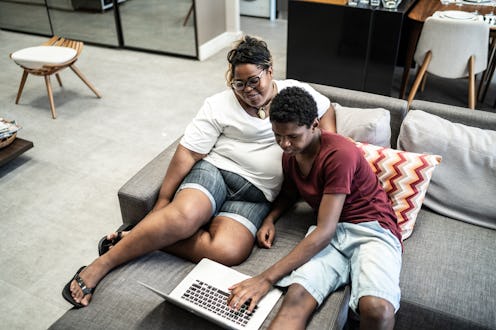Life
Giving Back: How Listening Is Connecting Generations
The Age of Empathy is providing new solutions to the mental health crisis among youth.

It’s no secret that young people are struggling with their mental health. And when we look at the state of the world around us, it’s not hard to see why. Cultural tensions have driven the country to one edge or the other—left or right, up and down—politically and emotionally. We’re divided in our viewpoints, scattered in our emotional state, and split on what we feel we need to make it all better. Kids are suffering from isolation, violence is spiking in communities across the country, and single parents are struggling to support their children’s remote and hybrid learning environments while maintaining the household income.
To better understand how young people are truly feeling and how we can support them, the BDG Trends Group went deep on Gen Z in a new study called, The Age of Empathy.
In some ways, the data shows us what we already know—struggling with mental health has become the norm, not an exception. Three-quarters (78%) of young people say they’ve experienced depression, or questioned their mental health, and 80% say their anxiety is at an all-time high as a result of the events of the past year. When asked to select the words that best describe their emotional state right now, 70% of the words chosen were negative.
With alarming stats like these, mental health continues to be the most important issue to Gen Z. Perhaps the most striking finding BDG Trends Group found, however, is that older Gen Z’s and younger Millennials (ages 18-34) are prioritizing coming together, having uncomfortable conversations, and listening to combat our increasingly fragmented world.
Gen Z is ushering the world into an entirely new age—the Age of Empathy. Almost unknowingly, they’re at the helm of a seismic shift—and here’s why. Zs were born “different”, fragmented by race, gender, sexuality and endless permutations of identity and interests, to a degree unlike any other generation. Finding camaraderie in difference, however, is rare, powerful, and a badge of honor. In order to find common ground and earn this badge, Zs—and young people by extension—have become incredibly empathetic: 61% say empathy is more powerful than action (39%) and 56% of young people agree finding common ground is even more important than recognizing difference (47%).
While many “ages” have moved us forward in the past—the Age of Empathy will be the first that is decidedly human rather than technological. And Zs are at the fore of it. Fifty-three percent agree, “This is the Age of Empathy—the future depends on emotional intelligence (53%)” rather than “This is the Age of Information—the future depends on technological advancement (47%)”.
If this research has taught us anything, it is that Gen Z is looking for deep connection and empathy as a way to deal with the emotional turmoil they are going through. However, generational differences between parents and teens can often cause the two to operate on two very different wavelengths concerning how to talk about mental and emotional wellbeing, leaving teens to neglect the support system they have in their own homes.
Sound It Out, a new initiative from the Ad Council and Pivotal Ventures, is tackling this issue head on. They’ve paired powerful artists such as KAMAUU, Empress Of, Lauren Jauregui, and Tobe Nwigwe with teens and their caregivers to create original songs from their feelings, crafting an album that will act as a catalog of emotions for both parents and kids to start and normalize conversations around emotional well-being. The full album is now available at SoundItOutTogether.org.
The site is also giving teens and their parents/caregivers actionable tips to guide them on how to have open conversations about emotional well-being, and to go beyond the default answer, “I’m fine.”
Gen Z is already living in the Age of Empathy, and music provides one more medium in which they can be raw and honest about how they feel. For parents, music serves as an entry point into breaking down barriers and making a commonly uncomfortable topic more accessible. It’s a conversation that is much needed for teens to feel a little less alone and a whole lot more understood in their homes.
To learn more about Sound It Out, please visit SoundItOutTogether.org.
This article was originally published on